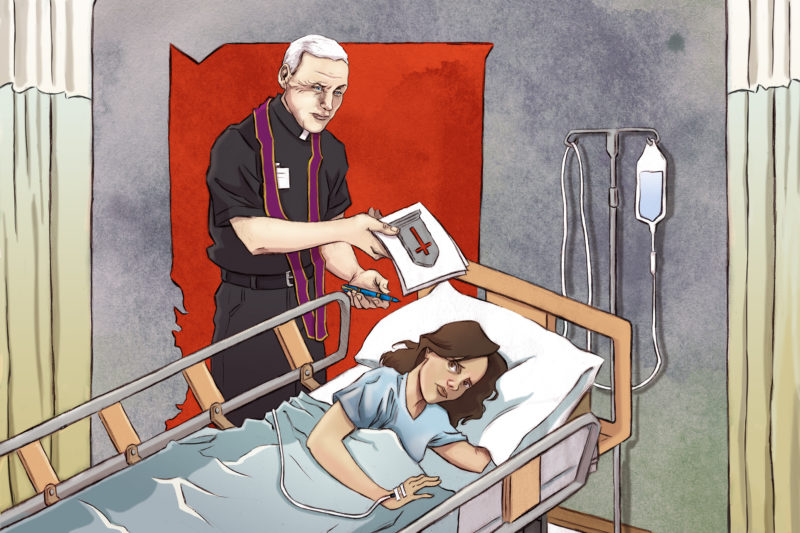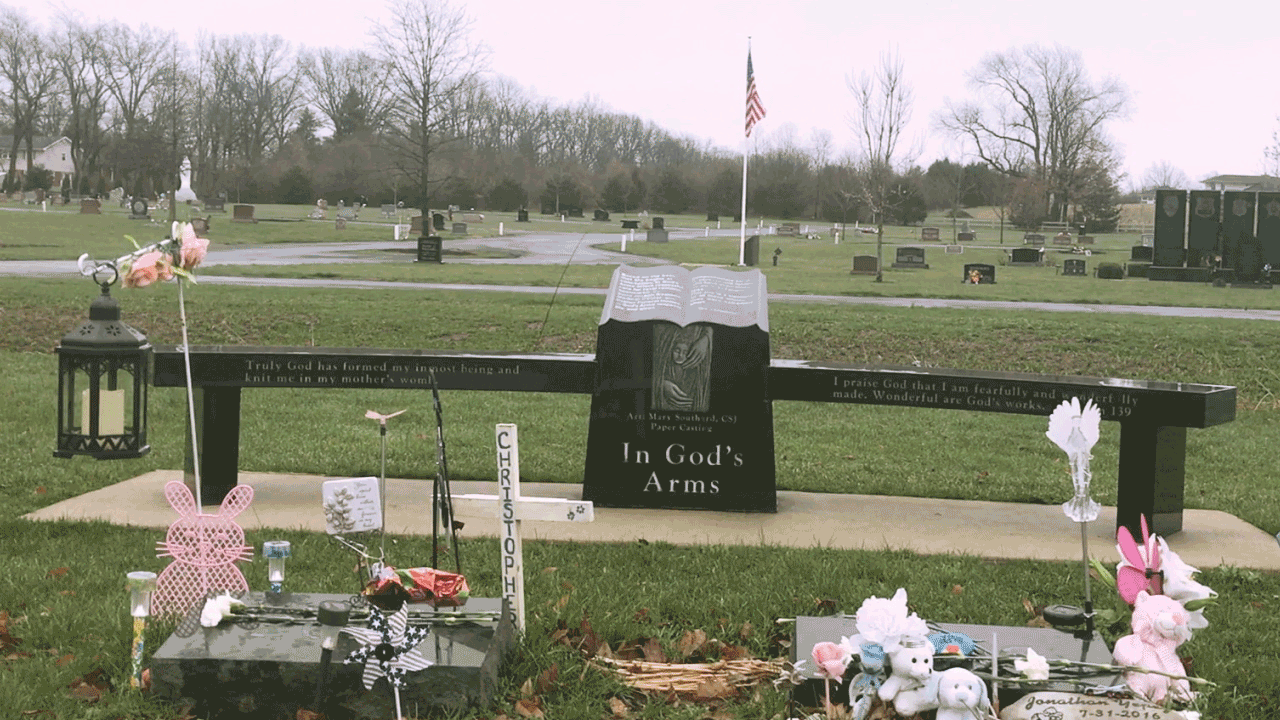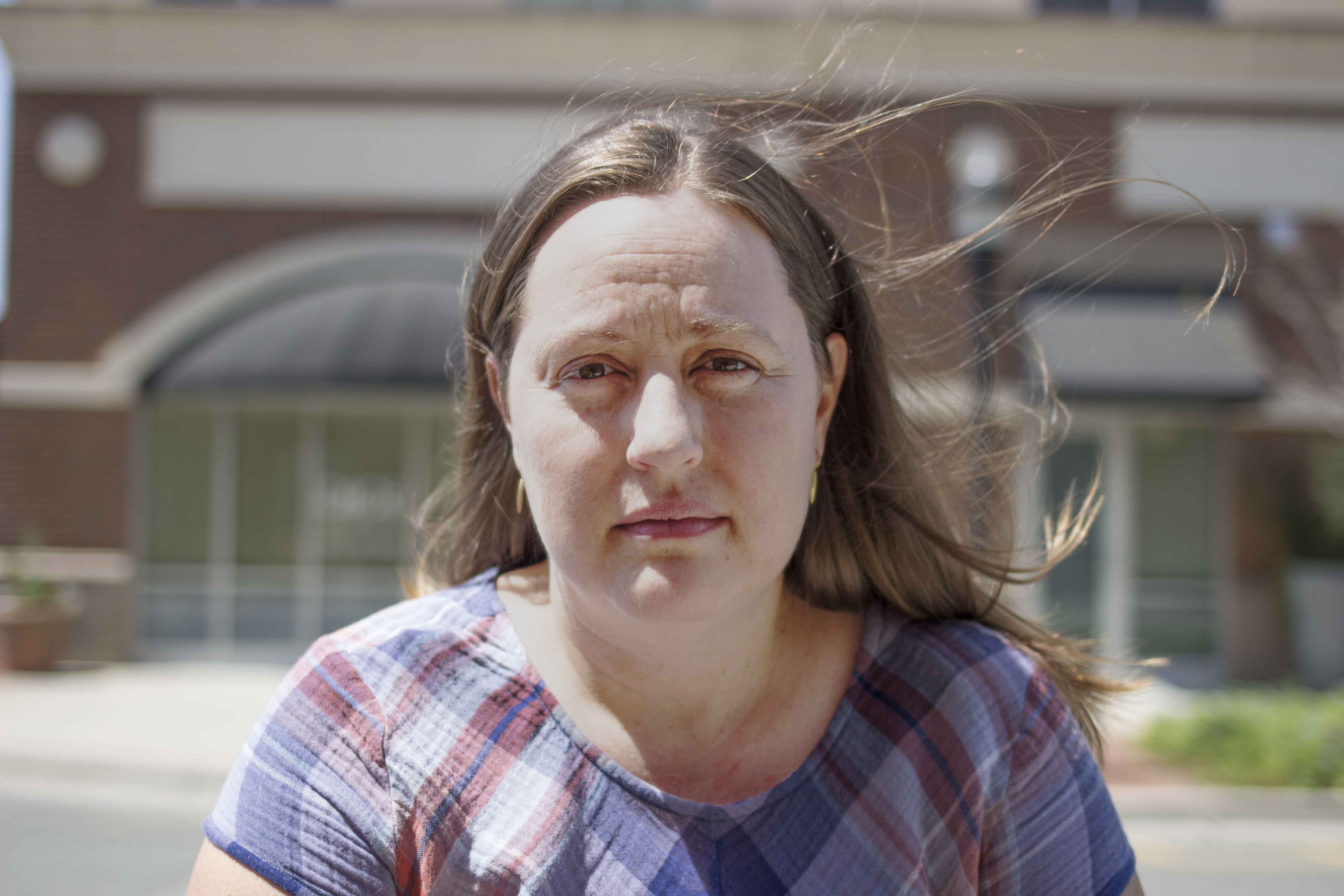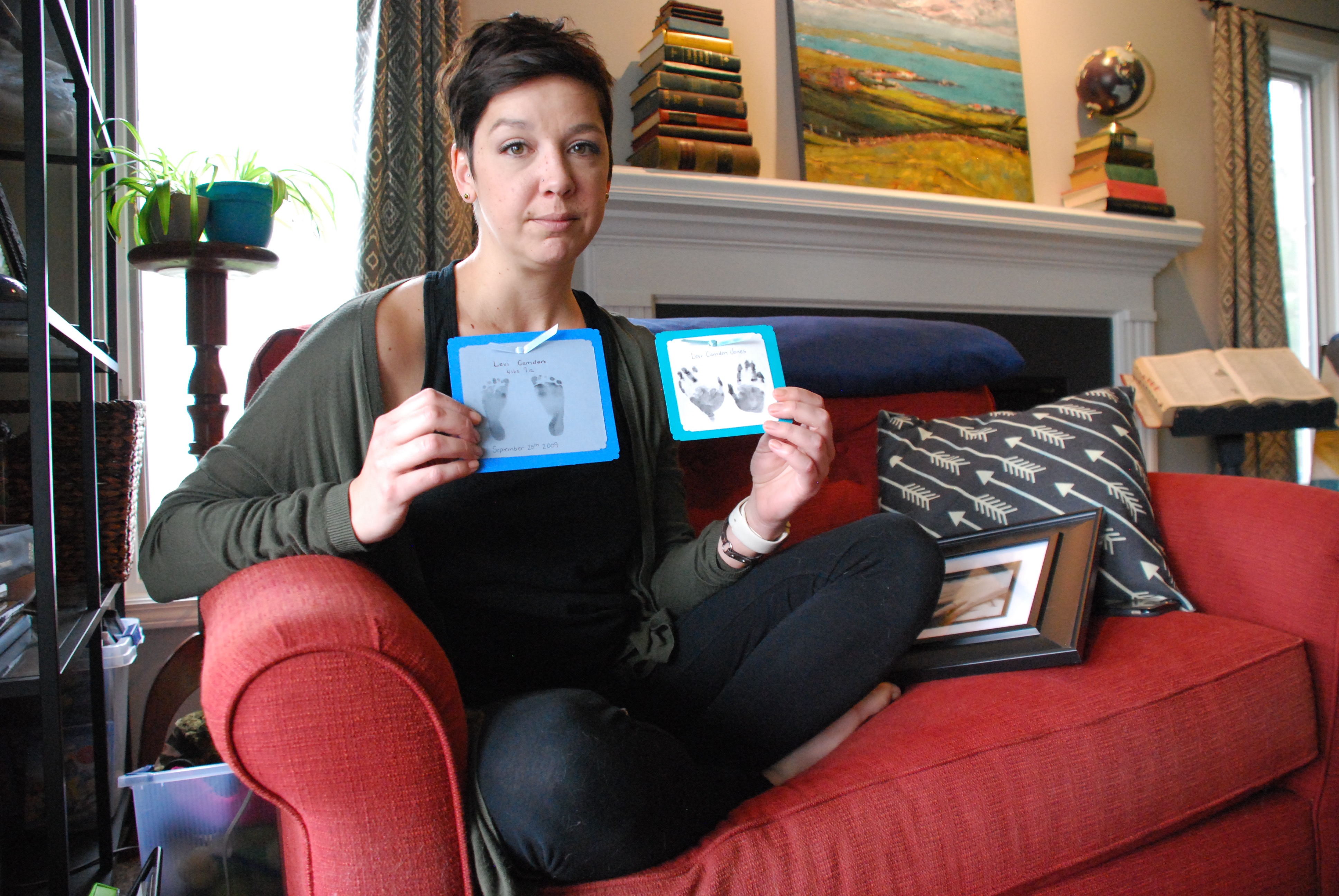Catholic Hospital Pressured Women to Bury Their Fetuses—Then Pence Made It Law
While many find comfort in fetal burial programs, imposing these practices on everyone who loses or ends a pregnancy can cause profound shame and distress, a Rewire investigation found.

Tethered to an IV, naked under her hospital gown, Kate Marshall felt trapped as the chaplain approached her bed. It was 2015, and Marshall was awaiting surgery at St. Joseph Regional Medical Center in Indiana after losing a much-wanted pregnancy. She had not asked to speak with a chaplain, but the man had nonetheless entered her room and then pressed her to sign a consent form that would allow the Catholic hospital to bury her 11-week fetus in a cemetery plot.
Marshall, a University of Notre Dame English professor who wanted nothing more than to have a baby, planned to send the fetal remains for testing, hoping to understand what had caused her miscarriage and thus avoid having another. She also did not want her fetus buried in a grave as if it were a full-grown person.
But the chaplain scorned her decision, Marshall told Rewire in an interview.
Gutted by the sudden loss of her pregnancy, and conscious every moment of the dead fetus that was still inside her body, Marshall asked him to leave five times before he finally did, according to a written complaint she filed with regulators the next day.
Then the second chaplain entered her room.
More aggressive than the first, she refused to leave, and accused Marshall of “sending my baby’s remains into a medical slush pile,” Marshall wrote in her complaint.
Kate’s sister watched the chaplains bring Kate to tears.
“They were sending this woman into surgery and she was, I mean she was shaking and crying,” Kelly Marshall told Rewire in an interview. “I felt like I let her down by not blocking them at the door.”
At the time, the hospital’s In God’s Arms program—which invites families who lose pregnancies before 20 weeks to gather for graveside memorial ceremonies—was optional, at least in theory. But if Vice President Mike Pence had his way, patients like Marshall would not have a choice about whether their miscarried fetuses are treated like dead people.
Legislation Pence signed as Indiana governor last year required all fetal remains to be cremated or buried, rather than disposed of as medical waste, as they have been in the United States for much of the last century. Based on religious beliefs about fetal “personhood,” the measure’s sole purpose was, in Pence’s words, to “ensure the dignified final treatment of the unborn.”
In a perverse twist, until recently, the law applied only to miscarriages, although it’s unclear to what extent it was enforced. That’s because the American Civil Liberties Union (ACLU) of Indiana successfully halted parts of the law in federal court last year, but did not initially challenge the miscarriage requirements. Then, this fall, U.S. District Court Judge Tanya Walton Pratt blocked both the miscarriage and abortion requirements for pre-viable fetuses, without defining viability. The state has vowed to appeal her decision to strike down those and other provisions of the law.
The law’s melding of religion and public policy has defined the legacy of Pence, who now plays a crucial role in steering such policy at the national level.
While many find comfort in fetal burial programs, imposing these practices on everyone who loses or ends a pregnancy can cause profound shame and distress, a Rewire investigation found. Indeed, even before Pence signed the legislation, St. Joseph had shown just how damaging this approach can be.
Public documents and interviews obtained by Rewire reveal that St. Joseph—a Catholic hospital that made headlines in 2013 for its role in the Purvi Patel case—pressed its fetal burial program on patients, a coercive approach to pregnancy loss to which Pence sought to give the blessing of law.
“Even If Other People Don’t Respect Life, We Feel Like We Need To”
In March, Rewire attended an In God’s Arms ceremony at Southlawn Cemetery in South Bend, Indiana, where we spoke with the program’s coordinator, Linda DeHahn—the second chaplain to enter Marshall’s room. DeHahn expressed horror at how she said fetal remains were treated before the In God’s Arms program began in 2006.
“The babies got handled the same way tissues from surgery get handled: They go to the lab and they go out for incineration, basically,” DeHahn told Rewire, her face registering her distress. “As a Catholic facility and organization we just felt that didn’t reflect who we were. And even if other people don’t respect life, we feel like we need to.”
Kate Marshall felt morally condemned by DeHahn and the other chaplain.
“In that moment there’s all kinds of conclusions you can draw, like somehow it’s your fault that you’ve lost this kid; you weren’t caring enough,” Marshall told Rewire. “I was being made to feel like I was the unfeeling, uncaring party in that transaction—that if this was a life that I valued I would be participating in that program, and that’s just none of their business. And it doesn’t matter, either, but in my particular case it was a life whose possibility I had cherished.”
The day after her surgery, Marshall fired off complaints to regulatory agencies.
“The abuses of these clergy members significantly exacerbated what already was a very stressful and emotionally devastating experience,” Marshall wrote in her complaint. “I am aware that the ‘In God’s Arms’ program can be helpful to many patients, but in this case it was invasive and damaging.”

The In God’s Arms plot in South Bend, Indiana (Amy Littlefield and Marc Faletti / Rewire)
Ultimately, Marshall’s fetal remains did get sent for testing. She went on to deliver her baby, Evelyn, the following year.
The Indiana State Department of Health investigated her complaint at the direction of the U.S. Centers for Medicare and Medicaid Services, records show. In interviews with investigators, chaplains confirmed that Marshall repeatedly declined the In God’s Arms program, although the first chaplain noted that he asked for permission to enter her room. DeHahn acknowledged to investigators that she approached Marshall even after being told that she didn’t want to see a chaplain, but denied making the “medical slush pile” comment, saying she told Marshall, “Let me be clear that you want the lab to do what they usually do with tissue.”
In a follow-up interview with Rewire in October, DeHahn confirmed her role in the case and said she has retired from her full-time position at the hospital. She referred questions to spokespeople for St. Joseph—which, shortly after Marshall’s visit, rebranded itself as Mishawaka Medical Center, under the umbrella of St. Joseph Health System.
“In God’s Arms is an optional program that offers comfort to families who experience an early pregnancy loss,” Jessica Shirley, public relations manager for St. Joseph Health System, wrote in an emailed statement. “For parents who choose not to participate in the program, the hospital honors these lives privately.”
St. Joseph has embraced anti-choice ideology in more overt ways. Financial records show the hospital’s foundation has donated about $100,000 annually in recent years to Women’s Care Center, a chain of crisis pregnancy centers—anti-choice fake clinics that often use disinformation to deter people from abortion. Under Pence, Women’s Care Center benefited from millions in public funding intended for poor families.
The hospital is also known for treating Purvi Patel, who was sentenced to 20 years in prison for charges including feticide in 2015 after delivering what she said was a stillborn fetus at home; her convictions were later vacated. The St. Joseph doctor who called the police on Patel belonged to an anti-choice medical association. Prosecutors also relied on testimony from hospital employees about Patel’s “flat affect” and lack of apparent distress.
In Marshall’s case, investigators ultimately found St. Joseph failed to follow its own policy affording patients the right to choose who visits them and to withdraw consent to such visits at any time. But the failure was not enough to threaten the hospital’s Medicare funding, records show. In a plan of correction responding to the findings, the hospital outlined procedures for documenting when patients decline a chaplain’s visit, and said it had revised its fetal remains consent form to allow chaplains to sign off if a patient declines to do so. St. Joseph Health System did not respond to a detailed list of questions from Rewire, including whether chaplains can authorize burial even if a patient opts out of the program.
“The In God’s Arms program is a widely respected and beloved service at St. Joseph’s Health System [sic] and what you described is not consistent with their approach to offering spiritual care,” Eve Pidgeon, a spokesperson for St. Joseph’s parent system, Trinity Health, said in a written statement to Rewire.
Here’s where Mike Pence enters the picture.
In their response to Marshall’s complaint, hospital officials noted they were “mindful of the requirements” of a law Pence signed in 2014 requiring health-care facilities to inform patients of their right to determine the final disposition of miscarried fetuses. Championed by the anti-choice Thomas More Society, the measure was part of an agenda to advance fetal “personhood” that would come to full flower in Indiana in 2016, with the passage of a bill known as HB 1337.
Among the most sweeping anti-choice measures ever passed in the United States, HB 1337 required burial or cremation of all fetal remains, regardless of whether the pregnancy ended in miscarriage or abortion.
In addition to the fetal burial requirement, the law banned abortions sought because of fetal disability, race, or sex, and it required patients to undergo an ultrasound 18 hours before an abortion, among other medically unnecessary restrictions.
It was so extreme that even some anti-choice Indiana lawmakers denounced it.
But the fact that Pence supported such draconian legislation should hardly come as a surprise. During his 12-year stint in Congress, he was an early leader of the Republican crusade to defund Planned Parenthood, a cause for which he threatened to shut down the federal government in 2011. Among the anti-choice bills he backed was one to let Catholic hospitals deny emergency abortions, even if patients would die without them. During his subsequent four years as Indiana governor, he signed every anti-choice bill to cross his desk—numbering at least eight. His best-known overreach was a so-called religious freedom law to sanction discrimination against LGBTQ people, which sparked a national outcry.
When the Indiana ACLU challenged HB 1337 on behalf of Planned Parenthood, it targeted the fetal burial requirements as they applied to abortion, which left the miscarriage requirements intact when a federal judge stopped sections of the law just before it took effect last summer. Then, this fall, the judge blocked the burial provisions for both miscarried and aborted fetuses pre-viability. Indiana Attorney General Curtis Hill has vowed to appeal.
The law was part of the anti-choice movement’s growing fixation on fetal remains.
In 2015, the Center for Medical Progress (CMP) released deceptively edited videos to falsely claim Planned Parenthood profits from fetal tissue. In response, the anti-choice behemoth Americans United for Life unveiled an updated model bill requiring “dignified final disposition” of fetal remains. Such measures gained traction in the aftermath of the CMP videos, particularly after the U.S. Supreme Court struck down other avenues of restricting access to abortion care. Texas, Louisiana, and Arkansas all passed versions of fetal burial legislation.
But Indiana’s version represented an extreme paradigm shift, Tanya Marsh, a Wake Forest University School of Law professor who studies funeral law, told Rewire.
“What Indiana did was say … ‘We’re going to reclassify all fetal remains after the moment of conception as human remains, and we’re going to put them under the jurisdiction of the funeral industry,’” Marsh said.
Kate Marshall, by then pregnant with Evelyn, watched the bill’s passage with dread; it felt, she said, as if the state was giving its approval to the mistreatment she had experienced at St. Joseph.
Even before it came into force, the law had a chilling effect on pregnant people in Indiana, as the story of Ali Brown in our companion piece shows.
 Kate Marshall (Jenn Stanley / Rewire)
Kate Marshall (Jenn Stanley / Rewire)
“We Felt Like We Were Being Judged”
Programs like In God’s Arms are not unique to Indiana, nor is the tendency of a growing number of Catholic hospitals to impose religion on patients.
Chrissy Helton, for example, told Rewire she went to a Catholic hospital in Edgewood, Kentucky, in 2001, still reeling from the news of her miscarriage and expecting surgery to remove the remains. But the hospital induced labor without giving Helton another option. Helton said she felt pressured to hold the fetus, which staff called a “baby,” and have portraits taken and a blessing administered; she said staff told her that she wouldn’t be able to do these things later, and that she might regret it if she refused. Finally, they removed the fetus from her hospital room and said they would bury it in a cemetery plot, requesting a donation for the purpose.
“I felt very pressured into everything that they threw out there on the table,” Helton told Rewire. “Then, later, realizing what had happened—that if I chose not to hold it, if I chose not [to take] the pictures, it didn’t make me less of a person, it didn’t make me less of a mother later on.”
A spokesperson for St. Elizabeth Healthcare said he could not comment on specific cases, but confirmed the hospital has a fetal burial program.
“We give the mothers the option: They can release their baby to a funeral home of their choice, they can receive the baby for a private burial, and if they refuse, which unfortunately it does happen sometimes … we have a site at St. Mary’s Cemetery here in northern Kentucky … and we do a ceremonial service … one time each year,” spokesperson Guy Karrick told Rewire. “It’s up to them if they want to be a part of it or not; it’s not coerced on anyone.”
Catholic hospitals control one in six acute-care beds nationwide; in Indiana, that number is about one in four. While reaping billions in public funding, these hospitals also generally restrict access to basic services, including abortion, sterilization, contraception, gender-affirming surgery, fertility treatments, and end-of-life care, under directives from the U.S. Conference of Catholic Bishops. The consequences for patients can be life threatening: The ACLU in 2015 sued St. Joseph’s parent company, Trinity Health, for a “repeated and systematic failure” to provide emergency abortions to people suffering pregnancy complications. Another ACLU lawsuit exposed how a Trinity hospital in Michigan sent a patient in excruciating pain home twice while she was miscarrying. (Both lawsuits were dismissed.) And thanks to the Trump/Pence administration and Supreme Court, these hospitals are poised to have broad new leeway to infringe on the rights of patients and employees.
But even secular hospitals have adopted practices that may unintentionally shame patients who don’t wish to bury or cremate their fetuses. In response to Pence’s 2014 miscarriage law, Indiana University Health, a leading academic medical center, adopted a consent form for pregnancy losses before 20 weeks that informs patients of their “right to choose to have a private cremation or burial service, or have the hospital arrange for common cremation for the baby’s body or miscarriage remains,” with a burial service offered for the ashes every six months.
While some of these offerings are longstanding, laws like the one Pence signed last year could make them compulsory, imposing civil penalties if health-care facilities fail to ensure burial or cremation. If patients choose a disposition option other than what the hospital typically uses, they are legally responsible for the cost. While the Indiana ACLU argued the law places no limitations on patients who choose to take custody of their remains, critics worried it was vague enough to apply to all miscarriages, even those that happened at home. Around the time of the law’s passage, DeHahn, the St. Joseph chaplain, said she received calls from surrounding hospitals who were interested in taking part in the In God’s Arms program.
“A Baby Who Deserved a Mother Better Than You”
After she suffered a miscarriage that required surgery at St. Joseph in 2012, Caroline and her husband carefully considered whether to participate in the In God’s Arms program. Caroline is Protestant and her husband, Matthew, is a devout Catholic. Rewire is withholding their real names at their request.
Sitting behind her desk in the South Bend area during an interview with Rewire, Caroline ticked off on her fingers the number of hours her children spend in religious activities: Catholic school, three to four religious services a week, Sunday school, youth group, church music classes. The couple waited for marriage to have sex; they do not use contraception, because, Caroline said, “We welcome children.”
On the ultrasound, her fetus had looked like a “sac collapsing on itself,” Caroline told Rewire. Neither she nor her husband felt attached to the fetus the way they did to their three children. They didn’t want to dwell on the loss.
But after the couple declined the In God’s Arms program, the St. Joseph chaplain, whose name Caroline does not remember, insisted on going through a packet of information. When they declined again, the chaplain pushed back. Had she mentioned that the program was free? She had.
Then came a series of forms, including one to allow St. Joseph to “properly care for the remains,” as Caroline recalled the chaplain describing it. Her words seemed to carry an implicit rebuke.
“The way it sounded to me as the patient was, since you clearly do not believe that you lost a child, since you do not want to participate in acknowledging this child’s death, you must think of this as medical waste, and only we will be responsible for properly caring for your child,” Caroline said.
Caroline’s husband, Matthew, recalled the chaplain emphasizing that if they opted out of the program, the fetus would be treated as medical debris. Rather than convince him, this approach clashed with the religious traditions he knew.
“If you want to talk to a minister or a priest or counseling, you invite them or you go to them,” Matthew told Rewire. “They don’t just come barging in [like] it’s their responsibility to get involved in your life and tell you what you’re feeling or supposed to be.”
After Caroline signed the paperwork allowing the hospital to bury her fetus, she said, the chaplain delivered what felt like a final insult, inquiring, “And how far along were you, may I ask?”
Caroline felt as if her religious beliefs had been placed on trial. Like Kate Marshall, she looked for an outlet, which she found by submitting an anonymous monologue to a local storytelling production.
“You do not recognize a child of God, a baby who deserves burial, a baby who deserves to be mourned just like any other person who has died,” Caroline wrote, describing the chaplain’s unspoken reproach. “A baby who deserved a mother better than you.”
This rigid view of pregnancy loss was echoed by Sister Laureen Painter, a St. Joseph Health System official who helped start the In God’s Arms program. Speaking to Rewire after the ceremony in March, Painter praised what she sees as an increasing reverence for fetal life in society.
“I think that as time has gone on, and as more and more people … understand that [at] that moment of conception, that life begins so quickly … I think that’s taken it more to the realization that you can’t just throw babies away,” she said.
Painter welcomed what she saw as the triumph of these religious beliefs becoming enshrined as the law of the land.
“Faith has dictated the law,” she said.
“The Path Through Grief and Loss Is a Very Personal One”
On the Sunday of the In God’s Arms ceremony, the mourners huddled under a green awning at the back of the cemetery. They sat on metal folding chairs, facing a sleek, black memorial, grasping white carnations to lay on the grave at the appointed time. Some unfurled umbrellas and opted to stand. Over the patter of rain, Chaplain Linda DeHahn welcomed them.
“To lose someone to death, at any age, is a tragedy,” she said. A man, dressed in black, wiped his eyes and kissed his partner on the top of her head.
 Jennifer Jones holds prints of the hands and feet of her stillborn son, Levi. (Amy Littlefield / Rewire)
Jennifer Jones holds prints of the hands and feet of her stillborn son, Levi. (Amy Littlefield / Rewire)
Among those who have found comfort in these rituals is Jennifer Jones. In 2009, Jones carried twin boys until 29 weeks, when one was stillborn, and the other born prematurely by cesarean section. Amid a blur of extremes—grief over her loss and joy at her son’s birth—Jones said a nurse at the secular Memorial Hospital of South Bend suggested she might want to think about a funeral home. As a matter of policy, nurses at the hospital cannot recommend a specific facility; to “remain unbiased,” they allow patients to make their own decisions, a spokesperson told Rewire.
It hadn’t occurred to Jones that she would have to think about her stillborn son Levi’s remains, but once the nurse mentioned it, Jones knew what she wanted.
She had attended an In God’s Arms ceremony with a friend who was treated for an ectopic pregnancy at St. Joseph, and felt comforted by the idea of burying Levi’s remains in that plot with the remains of other people’s lost pregnancies.
“He had always been right next to his brother,” Jones told Rewire in an interview. “I didn’t want him to be alone.”
While the In God’s Arms program is intended for earlier losses, Kerry Palmer, co-owner of Palmer Funeral Homes, assured Jones that he would take care of Levi. Palmer, whose business helped establish the In God’s Arms program, declined to comment at length for this article.
“My only comment is that we at Palmer, we help families through the loss of a baby at no charge,” Palmer told Rewire.
At the ceremony less than two weeks after her delivery, Jones, who is now training to become a counselor, felt bolstered by a sense of commonality with the other women there. It didn’t matter to her that she had been much further along in her pregnancy when she lost Levi.
“If it’s a pregnancy that you have tried for and you’ve given your body up for and you’re changing your lifestyle, you make sacrifices and you are injecting that idea with so much possibility of the future and so much hope,” Jones said. “I think that, to me, is what I could see in these other women’s eyes, was the loss of those hopes.”
Jones had a first-trimester miscarriage just before getting pregnant with her twins. But she hadn’t grown attached to that pregnancy in the same way. If anyone had tried to push her toward the fetal burial program then, she would have been furious, she said.
“I’m glad I had this resource when I needed it but I’m also really, really glad I wasn’t pressured into responding any ‘appropriate’ way for the other occasion,” Jones said. “The path through grief and loss is a very personal one and it needs to be handled that way.”
Jenn Stanley contributed reporting to this article.
Tell us your story. Have religious restrictions affected your ability to access health care? Email [email protected]
